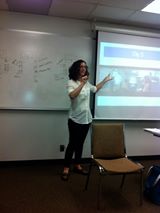Wow, it’s been a long time! Our last post was in March, sharing about the OTDHH conference. Sorry for the delayed posting, but it’s been awfully busy since then! Let’s recap what’s been going on with our Deaf Education professors and students since last March.
First, our 3 Deaf Education seniors not only completed their student teaching, but also graduated from TU, got jobs, and began graduate school at Gallaudet University! Wow, ladies – that is a lot of accomplishments in a short amount of time! Congratulations are definitely in order for Erin, Shelby, and Shawna.
Next, professor Jessica Scott officially became Dr. Jessica Scott – she defended her dissertation on Academic English and Deaf/Hard of Hearing Students in April, and graduated from Harvard Graduate School of Education in May. Not only that, but her dissertation won the Jeanne Chall Doctoral Student Research award – she will be traveling back to Boston in October to receive that!
Our professors also spent quite a bit of time traveling for work this summer. Dr. Baker attended the International Conference on Sign Language Acquisition in Amsterdam, and Dr. Scott was at the International Congress on Education of the Deaf in Greece! After ICED, Dr. Scott traveled back to St. Louis to begin her position as the Chair of the Deaf/Hard of Hearing Special Interest Group at the International Literacy Association.
And the professors weren’t the only ones traveling! One of our seniors spent the summer at Gallaudet University, and another visited Sienna, Italy, where she learned Italian Sign Language.
Phew! Our students and professors have had amazing, productive summers, and are ready to get back to work this fall! We hope that all of you accomplished all you hoped to during the summer break – feel free to let us know what you’ve been up to in the comments!








